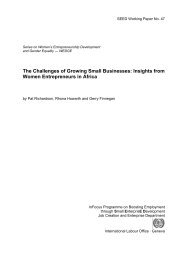manual: women workers' rights and gender equality - International ...
manual: women workers' rights and gender equality - International ...
manual: women workers' rights and gender equality - International ...
You also want an ePaper? Increase the reach of your titles
YUMPU automatically turns print PDFs into web optimized ePapers that Google loves.
(i)<br />
(ii)<br />
firstly, underst<strong>and</strong> that the problems they face are not individual problems but exist in many<br />
countries world wide, <strong>and</strong><br />
secondly, are provided with the tools to advocate for change.<br />
2. National Legal Rights<br />
National legal <strong>rights</strong> are those <strong>rights</strong> which are defined by national laws in each country, usually<br />
consisting of constitutional <strong>rights</strong>, <strong>rights</strong> laid down in national legislation such as the Penal Code,<br />
the Labour Code <strong>and</strong> the Civil Code <strong>and</strong> rules such as government regulations.<br />
2.1 Constitution<br />
Each country has a Constitution in which the fundamental <strong>rights</strong> of citizens are guaranteed. These<br />
<strong>rights</strong> are guaranteed to all citizens, usually regardless of their sex, race, ethnicity, caste, religion<br />
or status.<br />
The following <strong>rights</strong> are mentioned in the Constitution of the Kingdom of Cambodia:<br />
1. the right to equal treatment<br />
2. the right to life, personal freedom <strong>and</strong> security<br />
3. the right to vote<br />
4. the right to form/join an organization<br />
5. the right to express yourself freely<br />
6. the right to protection against violence <strong>and</strong> unfair treatment<br />
7. the right to freedom to travel<br />
8. the right to freedom of religion<br />
9. the right to ownership<br />
10. protection of the <strong>rights</strong> of children<br />
2.2 National laws<br />
Civil <strong>rights</strong> are <strong>rights</strong> to personal liberty which protect persons against arbitrary interference from<br />
the government or society. Common civil <strong>rights</strong> are the <strong>rights</strong> to family life, choice of language,<br />
freedom of expression <strong>and</strong> freedom of association. Civil <strong>rights</strong> are commonly laid down in national<br />
constitutions, <strong>and</strong> some, but not all of them are set out in civil codes. For example, the right to<br />
freedom of expression is a fundamental human right <strong>and</strong> a civil right, in other words applicable to<br />
all citizens. However, this right is usually not addressed in the civil codes of countries. Generally,<br />
the protection of freedom of expression is guaranteed in the Constitution <strong>and</strong> breaches are<br />
covered under the Penal Code.<br />
The Civil Code is a compilation of <strong>rights</strong> <strong>and</strong> duties which citizens have towards each other. Civil<br />
codes usually set out rules on marriage, inheritance law or descendancy. Civil codes do not<br />
necessarily directly protect human <strong>rights</strong>. For example, many civil codes stipulate that marriage<br />
creates a legal entitlement to affection <strong>and</strong> living together. This is not a human right per se but<br />
deals with the relations between citizens, in this case married couples.<br />
2.3 Rules <strong>and</strong> regulations<br />
In addition to the national laws such as the Penal Code, the Civil Code <strong>and</strong> the Labour Code there<br />
are government rules <strong>and</strong> regulations, called Prakas in Cambodia. These provide detailed<br />
descriptions of some <strong>rights</strong> in the national laws. Examples are the Prakas on Occupational Safety<br />
<strong>and</strong> Health issues, in which the minimum safety rules for the workplace are defined.<br />
148

















